- Home
- Gustave Aimard
The Border Rifles: A Tale of the Texan War Page 14
The Border Rifles: A Tale of the Texan War Read online
Page 14
CHAPTER XIV.
THE CONDUCTA DE PLATA.
We will now return to the caravan, which we saw leave the Potrero atsunrise, and in the Chief of which Carmela seemed so greatly interested.
This Chief was a young man of about five-and-twenty, with delicate,dashing, and distinguished features; he wore, with supreme elegance, thebrilliant uniform of a Captain of Dragoons.
Although he belonged to one of the oldest and noblest families inMexico, Don Juan Melendez de Gongora would only owe his promotion tohimself; an extraordinary desire in a country where military honour isregarded almost as nothing, and where only the superior grades givethose who hold them a degree of consideration which is rather the resultof fear than of sympathy, on the part of the people.
Still Don Juan had persevered in his eccentric idea, and each step hewon was not the result of a pronunciamento successfully carried out byany ambitious General, but that of a brilliant action. Don Juan belongedto that class of real Mexicans who honestly love their country, and who,jealous of its honour, dream for it a restoration, very difficult, ifnot impossible, to obtain.
The force of virtue is so great, even on the most depraved natures, thatCaptain Don Juan Melendez de Gongora was respected by all the men whoapproached him, even by those who loved him the least.
However, the Captain's virtue had nothing austere or exaggerated aboutit; he was a thorough soldier, gay, obliging, brave as his sword, andever ready to help, either with his arm or purse, all those, friends orfoes, who had recourse to him. Such, physically and morally, was the manwho commanded the caravan, and granted his protection to the monk whorode by his side.
This worthy Frayle, about whom we have had already occasion to say a fewwords, deserves a detailed description.
Physically, he was a man of about fifty, almost as tall as he was wide,bearing a striking likeness to a barrel set on legs, and yet gifted withfar from common strength and activity; his violet nose, his huge lips,and ruddy face, gave him a jovial appearance, which two little greysunken eyes, full of fire and resolution, rendered ironical and mocking.
Morally, he was in no way distinguished from the majority of Mexicanmonks--that is to say, he was ignorant as a carp, prone to drinking, apassionate lover of the fair sex, and superstitious in the highestdegree; but for all that, the best companion in the world, at home inall society, and always able to raise a laugh.
What singular accident could have brought him so far on the border? Thisno one knew or cared for, as everyone was aware of the vagabond humourof Mexican monks, whose life is constantly passed in roaming from oneplace to the other, without object, and generally without interest, butsimply at the dictates of caprice.
At this period, Texas, joined to another province, formed a state calledTexas and Cohahuila.
The party commanded by Don Juan de Melendez left Nacogdoches eight dayspreviously, bound for Mexico; but the Captain, in accordance with theinstructions he received, left the ordinary road, inundated at thatmoment with bands of brigands of every description, and made a longcircuit to avoid certain ill-famed gorges of the Sierra de San Saba. Hewould still have to cross that range; but on the side of the greatprairies, that is to say, at the spot where the plateaux, graduallydescending, do not offer those variations of landscape which are sodangerous to travellers.
The ten mules the Captain escorted must be loaded with very preciousmerchandise, for the Federal Government--seeing the small number oftroops it had in the State--to have resolved on having it convoyed byforty dragoons under an officer of Don Juan's reputation, whosepresence, under existing circumstances, would have been highlynecessary, not to say indispensable, in the interior of the State, inorder to suppress revolutionary attempts, and keep the inhabitants inthe path of duty.
In fact, the merchandise was very valuable; these ten mules transportedthree millions of piastres, which would assuredly be a grand windfallfor the insurgents, if they fell into their hands.
The time was left far behind, when, under the rule of the Viceroys, theSpanish flag borne at the head of a train of fifty or sixty mules ladenwith gold, was sufficient to protect a conducta de plata effectually,and enable it to traverse, without the slightest risk, the whole widthof Mexico, so great was the terror inspired by the mere name of Spain.
Now, it was not one hundred, or sixty mules; but ten, which fortyresolute men seemed hardly sufficient to protect.
The government considered it advisable to employ the greatest prudencein sending off this conducta, which had long been expected at Mexico.The greatest silence was maintained as to the hour and day of departure,and the road it would follow.
The bales were made so as to conceal, as far as possible, the nature ofthe merchandise carried; the mules sent off one by one, in open day,only under the protection of the arriero, joined, fifteen leagues fromthe town, the escort which had been encamped for more than a month,under some plausible excuse, in an ancient presidio.
All had, therefore, been foreseen and calculated with the greatest careand intelligence to get this precious merchandise in safety to itsdestination; the arrieros, the only persons who knew the value of theirload, would be careful not to speak about it, for the little theypossessed was made responsible for the safety of their freight, and theyran the risk of being utterly ruined if their mules were robbed on theroad.
The conducta advanced in the most excellent order, to the sound of theNena's bells; the arrieros sang gaily their mules, urging them on bythis eternal "arrea, Mula! Arrea, Linda!"
The pennons fastened to the long lances of the dragoons fluttered in themorning breeze, and the Captain listened idly to the monk's chatter,while at intervals taking a searching glance over the deserted plain.
"Come, come, Fray Antonio," he said to his stout companion, "you can nolonger regret having set out at so early an hour, for the morning ismagnificent, and everything forebodes a pleasant day."
"Yes, yes," the other replied with a laugh; "thanks to Nuestra Senora dela Soledad, honourable Captain, we are in the best possible state fortravelling."
"Well, I am glad to find you in such good spirits, for I feared lest therather sudden waking this morning might have stirred up your bile."
"I, good gracious, honourable Captain!" he replied, with feignedhumility; "we unworthy members of the church must submit withoutmurmuring to all the tribulations which it pleases the Lord to send us;and besides, life is so short, that it is better only to look at thebright side, not to lose in vain regret the few moments of joy to whichwe can lay claim."
"Bravo! That is the sort of philosophy I like; you are a good companion,Padre--I hope we shall travel together for a long while."
"That depends a little on you, Senor Captain."
"On me? how so?"
"Well, on the direction you propose following."
"Hum!" Don Juan said; "and pray where may you be going, Senor Padre?"
This old-fashioned tactic of answering one question by another, isexcellent, and nearly always succeeds. This time the monk was caught;but, in accordance with the habit of his brethren, his answer was as itwas meant to be, evasive.
"Oh, I," he said with affected carelessness; "all roads are prettynearly the same to me; my gown assures me, wherever chance bends mysteps, pleasant faces and hearty reception."
"That is true; hence I am surprised at the question you asked me aninstant back."
"Oh, it is not worth troubling yourself about, honourable Captain. Ishould feel agonised at having annoyed you, hence I humbly beg you topardon me."
"You have in no way annoyed me, Senor Padre. I have no reason forconcealing the road I purpose following; this recua of mules I amescorting does not affect me in any way, and I propose leaving itto-morrow or the day after."
The monk could not restrain a start of surprise.
"Ah!" he said, as he looked searchingly at the speaker.
"Oh yes," the Captain continued, in an easy tone, "these worthy menbegged me to accompany them for a few days, through fear
of the gavillasthat infest the roads; they have, it appears, valuable merchandize withthem, and would not like to be plundered."
"I understand; it would not be at all pleasant for them."
"Would it? hence I did not like to refuse them the slight service whichtook me only a little way out of my road; but so soon as they considerthemselves in safety, I shall leave them and enter the prairie, inaccordance with the instructions I have received, for you know that theIndios Bravos are stirring."
"No, I was not aware of it."
"Well, in that case, I tell it you; there is a magnificent opportunitythat presents itself to you, Padre Antonio, and you must not neglectit."
"A magnificent opportunity for me?" the monk repeated, in amazement;"What opportunity, honourable Captain?"
"For preaching to the Infidels, and teaching them the dogmas of our HolyFaith," he replied, with imperturbable coolness.
At this abrupt proposal the monk made a frightful face.
"Deuce take the opportunity!" he exclaimed, snapping his fingers; "Iwill leave that to other asses! I feel no inclination for martyrdom."
"As you please, Padre; still you are wrong."
"That is possible, honourable Captain, but hang me if I accompany younear those pagans; in two days I shall leave you."
"So soon as that?"
"Why, I suppose, that since you are going on to the prairie, you willleave the recua of mules you are escorting at the Rancho of San Jacinto,which is the extreme point of the Mexican possessions on the desertborder."
"It is probable."
"Well, I will go on with the muleteers; as all the dangerous passes willthen have been left behind, I shall have nothing to fear, and shallcontinue my journey in the most agreeable way possible."
"Ah," the Captain said to him, with a piercing glance; but he was unableto continue this conversation, which seemed highly interesting to him,for a horseman galloped up at full speed from the front, stopped beforehim, and stooping to his ear, whispered a few words.
The Captain looked scrutinizingly round him, drew himself up in thesaddle, and addressed the soldier--
"Very good. How many are they?"
"Two, Captain."
"Watch them, but do not let them suspect they are prisoners; on arrivingat the halting ground I will cross-question them. Rejoin your comrades."
The soldier bowed respectfully without reply, and went off at the samespeed he had come up.
Captain Melendez had for a long time accustomed his subordinates not todiscuss his orders, but obey them unhesitatingly.
We mention this fact because it is excessively rare in Mexico, wheremilitary discipline is almost a nullity, and subordination unknown.
Don Juan closed up the ranks of the escort, and ordered them to hurryon.
The monk had seen with secret alarm the conference between the officerand the soldier, of which he was unable to catch a word. When theCaptain, after attentively watching the execution of his orders,returned to his place by his side, Father Antonio tried to jest aboutwhat had happened, and the cloud of gravity that had suddenly darkenedthe officer's face.
"Oh, oh," he said to him, with a loud laugh, "how gloomy you are,Captain! did you see three owls flying on your right? The pagans assertthat such is an evil omen."
"Perhaps so," the Captain drily replied.
The tone in which the remark was uttered had nothing friendly orinviting about it. The monk understood that any conversation at thismoment was impossible; he took the hint, bit his lips, and continued toride silently by his companion's side.
An hour later they reached the bivouac; neither the monk nor the officerhad said a word; but the nearer they came to the spot selected for thehalt, the more anxious each seemed to grow.

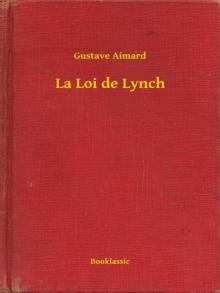 La loi de lynch. English
La loi de lynch. English The Guide of the Desert
The Guide of the Desert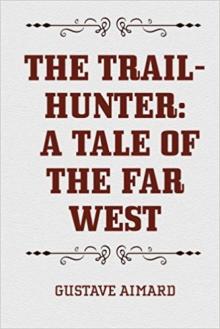 The Trail-Hunter: A Tale of the Far West
The Trail-Hunter: A Tale of the Far West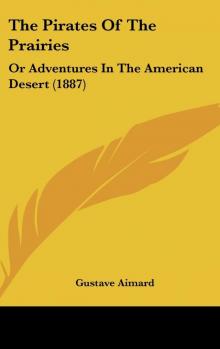 The Pirates of the Prairies: Adventures in the American Desert
The Pirates of the Prairies: Adventures in the American Desert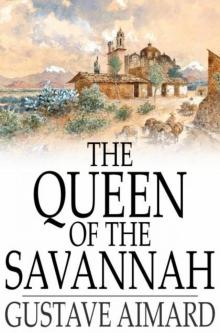 The Treasure of Pearls: A Romance of Adventures in California
The Treasure of Pearls: A Romance of Adventures in California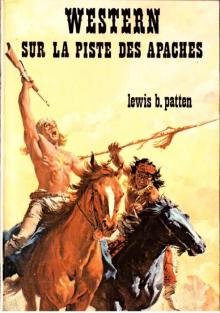 Les outlaws du Missouri. English
Les outlaws du Missouri. English Les trappeurs de l'Arkansas. English
Les trappeurs de l'Arkansas. English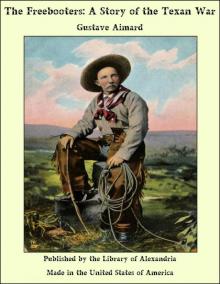 The Border Rifles: A Tale of the Texan War
The Border Rifles: A Tale of the Texan War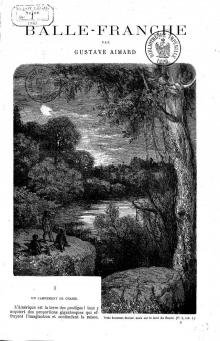 Balle-Franche. English
Balle-Franche. English The Queen of the Savannah: A Story of the Mexican War
The Queen of the Savannah: A Story of the Mexican War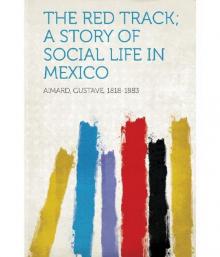 The Red Track: A Story of Social Life in Mexico
The Red Track: A Story of Social Life in Mexico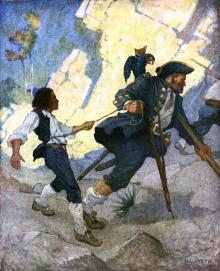 La fièvre d'or. English
La fièvre d'or. English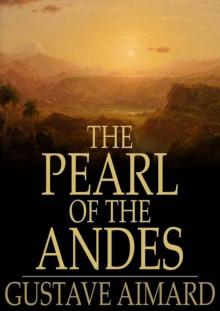 The Pearl of the Andes: A Tale of Love and Adventure
The Pearl of the Andes: A Tale of Love and Adventure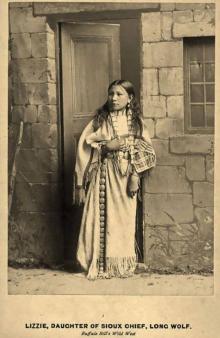 Les fils de la tortue. English
Les fils de la tortue. English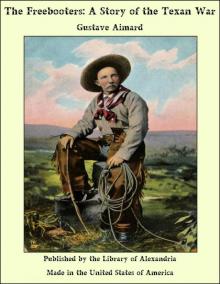 The Indian Chief: The Story of a Revolution
The Indian Chief: The Story of a Revolution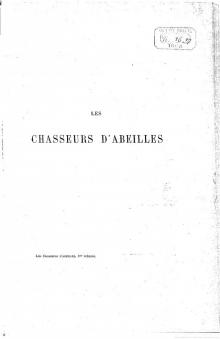 Les chasseurs d'abeilles. English
Les chasseurs d'abeilles. English The Adventurers
The Adventurers